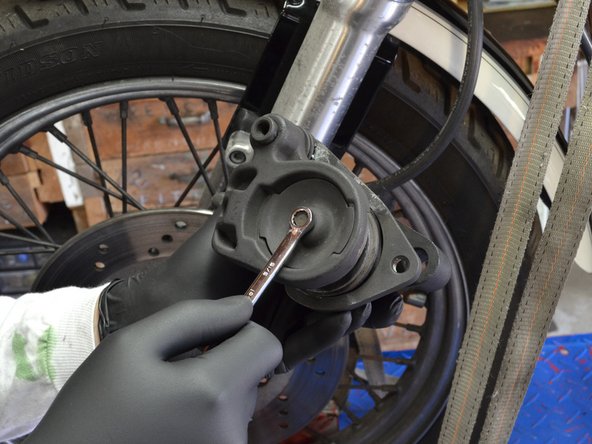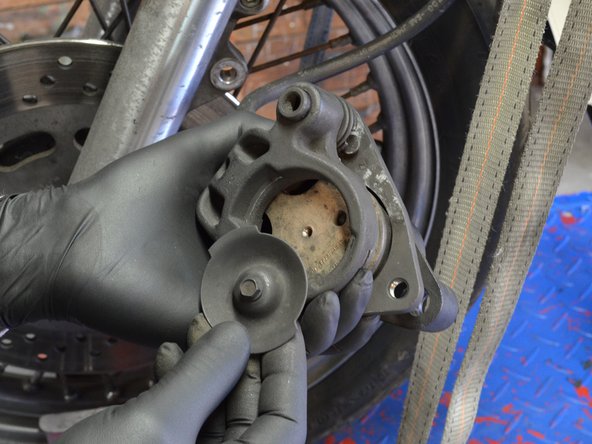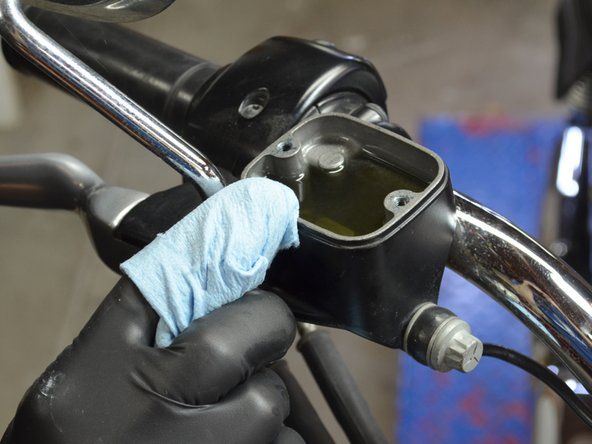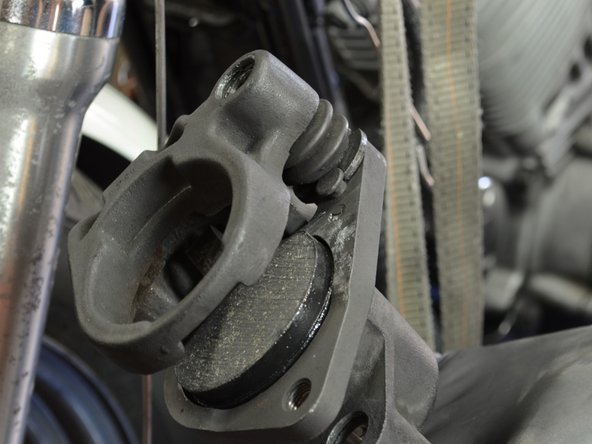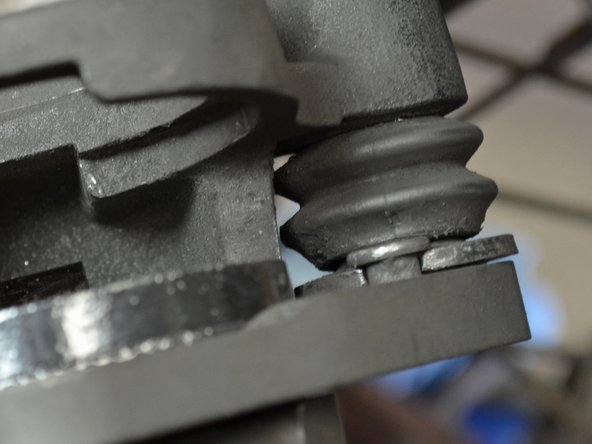Esta versión puede contener ediciones incorrectas. Cambie a la última instantánea verificada.
Qué necesitas
-
Este paso está sin traducir. Ayuda a traducirlo
-
For the best access to the brake pads, we recommend securing the motorcycle in an upright position.
-
If you do not have a motorcycle lift, you will still be able change the brake pads, but it is still a good idea to secure the front wheel in place.
-
-
Este paso está sin traducir. Ayuda a traducirlo
-
Hang the caliper on a metal hanger attached to the handlebars or headlights.
-
-
Este paso está sin traducir. Ayuda a traducirlo
-
Using a 1/4" hex head or allen wrench, unscrew the two bolts holding the front brake assembly to the fork.
-
Unscrew and remove the bottom bolt, but do not completely remove the top bolt yet.
-
-
Este paso está sin traducir. Ayuda a traducirlo
-
Supporting the brake assembly with one hand, remove the top bolt.
-
Carefully slide the brake off of the brake rotor and hang it from the metal hanger.
-
-
Este paso está sin traducir. Ayuda a traducirlo
-
Using a 5/16 wrench, remove the bolt holding the stationary brake pad cover in place.
-
Remove the stationary brake pad cover from the brake assembly.
-
-
Este paso está sin traducir. Ayuda a traducirlo
-
Being careful to not let any loose parts fall out of the brake assembly, remove the stationary brake pad from the front brake assembly.
-
-
Este paso está sin traducir. Ayuda a traducirlo
-
Remove the floating caliper and remaining brake pad from the caliper assembly.
-
-
-
Este paso está sin traducir. Ayuda a traducirlo
-
Using a can of brake cleaner, spray out the piston and inside of the brake caliper.
-
-
Este paso está sin traducir. Ayuda a traducirlo
-
Using a Phillips #2 screwdriver, remove the two screws securing the cover on the master brake-fluid reservoir.
-
Carefully remove the cover of the master reservoir, making sure that you do not spill any of the brake fluid.
-
-
Este paso está sin traducir. Ayuda a traducirlo
-
Position the screw of a large C clamp so that the head of the screw is pressing against the inside of the brake piston.
-
It is possible to use your hands rather than a C clamp, but it is much more difficult.
-
Slowly tighten the C clamp, forcing the brake piston back into the brake cylinder until it is completely depressed.
-
-
Este paso está sin traducir. Ayuda a traducirlo
-
To prevent spilling any brake fluid, first clean the area around the master cylinder with a clean rag, then replace the cover.
-
-
Este paso está sin traducir. Ayuda a traducirlo
-
Inspect the new brake pads for chips or other signs of wear.
-
Apply a moderate amount of anti-squeal compound to the back of each new brake pad.
-
-
Este paso está sin traducir. Ayuda a traducirlo
-
Using your fingers, pull the alignment peg out of its hole in the stationary caliper.
-
Apply a thin layer of grease to the alignment peg.
-
Re-install the alignment peg, but do not push it all the way in. Only push it in about half-way.
-
-
Este paso está sin traducir. Ayuda a traducirlo
-
The spring should be on the same side as the alignment peg.
-
Place one of the brake pads into the floating caliper, with the anti-squeal side facing away from the spring and mount peg.
-
-
Este paso está sin traducir. Ayuda a traducirlo
-
Holding the brake assembly in one hand and the floating caliper in the other, gently slide the floating caliper into the front brake assembly.
-
Move the floating caliper alignment peg so that the metal tab on the floating caliper fits together with the indentation on the alignment peg.
-
-
Este paso está sin traducir. Ayuda a traducirlo
-
Being careful to not dislodge the floating caliper, insert the stationary brake pad so that the tab on the brake pad fits into the corresponding slot on the stationary caliper.
-
-
Este paso está sin traducir. Ayuda a traducirlo
-
Using one hand to keep the brake pads from falling out, replace the cover on the stationary brake pad.
-
Insert the screw and lock washer that came with the brake pads and tighten using a Phillips #2 screwdriver.
-
-
Este paso está sin traducir. Ayuda a traducirlo
-
With the piston on the outside of the rotor, carefully slide the front brake assembly back over the rotor
-
Slide the brake assembly until the lower hole in the brake assembly aligns with the lower mount hole on the fork.
-
-
Este paso está sin traducir. Ayuda a traducirlo
-
Apply a small amount of grease on the lower brake mount screw.
-
Insert the screw into the lower mount hole.
-
-
Este paso está sin traducir. Ayuda a traducirlo
-
Insert the upper retaining bolt into the upper bolt hole in the fork and brake assembly.
-
Using only your hands, tighten the bolt as much as possible.
-
-
Este paso está sin traducir. Ayuda a traducirlo
-
Using a torque wrench, tighten both screws to between 25 and 30 foot-pounds.
-
Cancelar: No complete esta guía.
9 personas más completaron esta guía.
9 comentarios
Nice job. Was looking for a picture of that darn anti vibration clip. Thanks
The spring clip is installed wrong. The brake pad will rattle. Push the brake pad in from the rotor side with the clip pushing down hard on the pad holding it in the housing. The clip is to stop the pad from rattling in the housing, not to hold it against the piston.
GOOD JOB !!! This is almost the same exact as my 98 road king brakes.
Brett Hartt: this is so valuable for simple latin american like me. A professional tool that you are giving away. G. bless your generations forever.










